Impact Stories from Youth Engagement Policy Area
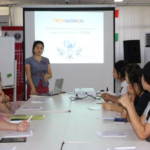
Fellow awarded grant for STEM-based education initiative
Fellow(s): Mutriba Akhmedova
Country: Tajikistan
Cohort: 2015
Policy Area(s): Education Diplomacy/Mentoring, Empowering Women and Girls, Professional Growth, Youth Engagement
Mutriba Akhmedova, 2015 fellow of Tajikistan, was awarded a U.S. Embassy Alumni Grant for her new initiative, Girls in STEM. Through digital literacy workshops, information sessions and tech bootcamps, Girls in STEM will encourage high school girls in Tajikistan to choose careers in STEM fields, hoping to reduce societal stereotypes of women in STEM along the way. “STEM is new for the people of Tajikistan, especially in schools,” Mutriba said. “The project will hopefully have a huge impact on girls.”
The Public Affairs section of the U.S. Embassy in Tajikistan administers an annual Alumni Grant Program to support alumni-initiated projects aimed at promoting community service and the dissemination of professional knowledge. Next month, Mutriba will officially launch Girls in STEM, targeting 40 girls throughout four regions of Tajikistan, providing immersive education experiences and instilling in them a passion for STEM fields.
Report Date...: 10/15/2018

Fellow convenes summit in Abuja to advocate for girls’ rights
Fellow(s): Carolyn Seaman
Country: Nigeria
Cohort: 2017
Policy Area(s): Education Diplomacy/Mentoring, Empowering Women and Girls, Professional Growth, Youth Engagement
2017 fellow of Nigeria Carolyn Seaman, founder of Girls Voices, organized the 2018 Girls Summit in Abuja last week to commemorate International Day of the Girl. The event, implemented in partnership with the Global Fund for Women, brought together government agencies, advocates, representatives of diplomatic missions and the media to advance girls’ voices and advocate for their rights and protection. Throughout the day, 126 secondary school girls addressed the summit’s attendees, speaking about child marriage, gender-based violence and girls’ lack of equal educational opportunities.
Carolyn, referencing Nigeria’s rank of 122 out of 144 in the 2017 Global Gender Gap Report, aimed to secure commitments from stakeholders in order to protect girls’ rights and security. By the end of the day, stakeholders drafted a statement committing themselves to increase outreach, support engaging initiatives and mobilize to protect girls’ rights. As one young participant said in her remarks to the audience, “We want the chance to be leaders of today… tomorrow is too far.”
Report Date...: 10/15/2018
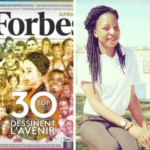
Fellow named to 30 under 30 list by Forbes Africa
Fellow(s): Arielle Kitio
Country: Cameroon
Cohort: 2016
Policy Area(s): Education Diplomacy/Mentoring, Empowering Women and Girls, Professional Growth, Youth Engagement
Arielle Kitio, 2016 fellow of Cameroon, was recently named 30 under 30 for Forbes Africa (website in French). Arielle was recognized for her work as the founder of CAYSTI, an initiative that supports and educates students through after-school STEM programs, a youth tech lab and a business incubator aimed at improving the gender balance in tech. “Our vison at CAYSTI is to create an egalitarian ecosystem where every youth from [least developed countries], regardless of sex, language or social level have equal access to meaningful STEM learning experiences,” she said. “Our programs and tools are designed to create the next generation of leaders with technology as an equalizer and empowerment tool.”
In addition to her work with CAYSTI, Arielle is a Technovation mentor as well as a Next Einstein Ambassador, representing Cameroon at Next Einstein Forum programs and sharing her work and publications on their platforms.
Report Date...: 10/8/2018

Fellow secures funding for STEM education initiative with support from TechWomen mentors
Fellow(s): Chioma Ezedi
Country: Nigeria, United States
Cohort: 2016
Policy Area(s): Education Diplomacy/Mentoring, Empowering Women and Girls, Professional Growth, Youth Engagement
Chioma Ezedi, 2016 fellow of Nigeria, recently received U.S. State Department funding for STEMTeers, her initiative that provides STEM-based educational programming to students in Nigeria. Chioma, while participating in TechWomen’s 2018 delegation trip to Nigeria, shared the difficulties she was facing as she searched for funding to continue STEMTeers activities.
During the delegation, she connected with Impact Coach Jessica Dickinson Goodman for support, who along with TechWomen Professional Mentor Larissa Shapiro reviewed Chioma’s grant application, providing valuable input on how to better position STEMTeers. “Jessica showed me how I can make the application more exciting, clear and focused,” said Chioma.
Building on the success of sessions they led during the delegation trip, Jessica and Larissa also recently facilitated an enrichment webinar for fellows, “Finding Funding for Social Impact Projects,” and Jessica has compiled and shared a database of more than 2,000 grants available in TechWomen program countries.
In addition to founding STEMTeers, Chioma is a software programmer at Abubakar Tafawa Balewa University in Nigeria. Jessica is currently an Impact Coach for Emerging Leaders from the Palestinian Territories, supporting them in the development of their action plan, and Larissa is a Professional Mentor at Mozilla.
Report Date...: 10/1/18

Team Pakistan shares action plan updates in guest blog post
Fellow(s): Saima Shabbir, Zainab Saleem
Country: Pakistan
Cohort: 2017
Policy Area(s): Empowering Women and Girls, Professional Growth, Youth Engagement
In a new guest post published on the TechWomen blog, 2017 fellows of Pakistan Saima Shabbir and Zainab Saleem provide updates on their seed grant-winning action plan project, She For Tech. Addressing Pakistan’s gender disparity in science and technology, She For Tech aims to inspire the next generation of women to become engaged and involved in STEM through critical thinking, problem solving and technology comprehension for young women, as well as a mentorship and support network.
This month, they held a one-day program at a local public school in Islamabad, bringing together women mentors in STEM careers who educated students on opportunities in STEM fields. By using the “Three Cs”—career counseling, camps and competitions—and engaging a community of mentors, She For Tech hopes to educate girls on STEM careers, provide free online resources and exciting challenges, and encourage young women to eradicate stereotypes in their country.
Report Date...: 9/3/2018
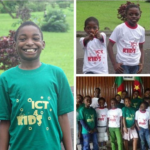
Fellow launches training initiative for local youth
Fellow(s): Mpara Faith
Country: Cameroon
Cohort: 2017
Policy Area(s): Empowering Women and Girls, Professional Growth, Youth Engagement
2017 fellow of Cameroon Mpara Faith recently launched ICT4KIDS, a training program to educate and empower local children in Cameroon. Using lessons in computer programming, game development and graphic design, Mpara and her staff spent six weeks training 16 girls and boys ages five to 18.
The program culminated at the University of Buea in a closing ceremony, during which participants received certificates and prizes for their various projects developed during the training sessions. ICT4KIDS also released a video featuring program highlights, such as in-class programming, game design and cartooning sessions.
While in TechWomen, Mpara was mentored at Synopsys and was a member of the seed grant-winning team behind Able Too. Currently, she is the co-founder and operations manager at New Generation Technologies and was named one of the 50 most influential young Cameroonians in 2017.
Report Date...: 9/3/2018
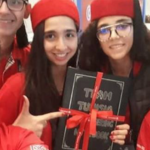
Team Tunisia wins four awards at FIRST Global Challenge 2018
Fellow(s): Faten Khalfallah
Country: Tunisia
Cohort: 2015
Policy Area(s): Education Diplomacy/Mentoring, Professional Growth, Youth Engagement
2015 fellow of Tunisia Faten Khalfallah led a group of students to victory at the 2018 FIRST Global Challenge in Mexico City. The annual robotics competition, which centers on 14 Grand Challenges for improving life on the planet as identified by the U.S National Academy of Engineering, brings together 192 countries in a three-day Olympics-style robotics competition. Team Tunisia, comprised of local youth mentored by Faten, won two gold medals: the Dr. Mae Jemison Award for International Unity, awarded to teams that break down barriers and build bridges, and the Munsa Mousa award for fundraising. They also won the Social Media Award, and Faten was presented the Outstanding Mentor Award for her exceptional leadership.
While in the TechWomen program, Faten was hosted at Autodesk, learning more about 3D design software. After returning home, she organized a summer tech camp to bring students together for five days of immersive STEM experiences and was selected as a 2016 Generation Change Fellow from the United States Institute of Peace. Currently, she is a regional project coordinator and ambassador of the VEX Girl-Powered Initiative at VEX Robotics.
Report Date...: 8/27/2018
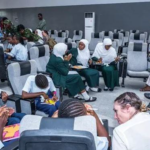
Fellow shares delegation trip experience in blog post
Fellow(s): Binta Moustapha
Country: Nigeria
Cohort: 2014
Policy Area(s): Empowering Women and Girls, Professional Growth, Youth Engagement
In a blog written for Science Communication Hub Nigeria, 2014 fellow Binta Moustapha shares her experience during the TechWomen delegation trip to Nigeria, where she faciliatated a hands-on STEM day for girls aged 13-18 in Abuja:
“The beauty of the workshop and others hosted during this visit was an amazing opportunity for some of these delegates – the Tech Ambassadors – to get the first-hand experience of Nigeria while providing meaningful transfer of knowledge skills and experience with both the participants and the TechWomen fellows… We should continually promote such exchanges, especially the acquisition of digital skills and making science fun to learn.”
Binta’s post, “TechPlomacy: a new frontier for Nigeria,” can be found here.
Report Date...: 8/20/2018
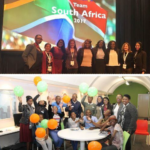
Team South Africa shares action plan news in guest blog post
Fellow(s): Emily Pather and Team South Africa
Country: South Africa
Cohort: 2017
Policy Area(s): Empowering Women and Girls, Youth Engagement
2017 fellow of South Africa Emily Pather authored a guest post for the TechWomen blog on behalf of KasiMaths, a seed grant-winning action plan project. Team South Africa conceived of KasiMaths through the desire to make a difference in the lives of underprivileged students: “Kasi” refers to township areas that house historically socially and economically disadvantaged people. Inspired by the program’s mission statement – Math is Fun, Math is Essential, Math is Everywhere – KasiMaths helps these students develop mathematical skills and gain confidence in their abilities.
This June, KasiMaths launched their first hub in partnership with the U.S Embassy in South Africa and the Rosa Park Library in Soweto. “We have 16 eager students and five passionate volunteers,” says Emily. Moving forward, team South Africa hopes that their community-based approach and low-cost delivery model will allow KasiMaths to be scalable, replicable and continue to have meaningful impact in their community.
Report Date...: 8/20/2018
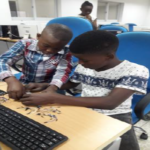
Fellow launches STEM training program for youth
Fellow(s): Beatrice Sonfack
Country: Cameroon
Cohort: 2016
Policy Area(s): Empowering Women and Girls, Professional Growth, Youth Engagement
2016 fellow of Cameroon Beatrice Sonfack recently launched INNOVTECH, an after-school training program for local youth. The program begins with STEM-based teaching and training and culminates in a week of hands-on activities and experiments in a local makerspace. At the end of INNOVTECH, students present their projects to a panel of judges, competing for the opportunity to receive mentoring and guidance on how to bring their project to market. The program is part of Wentech, an initiative Beatrice launched that encourages young girls to become involved in STEM through education and training.
Beatrice, an electrical engineer and educator, was hosted by Folsom Labs while in the TechWomen program.
Read More »Report Date...: 8/13/2018

